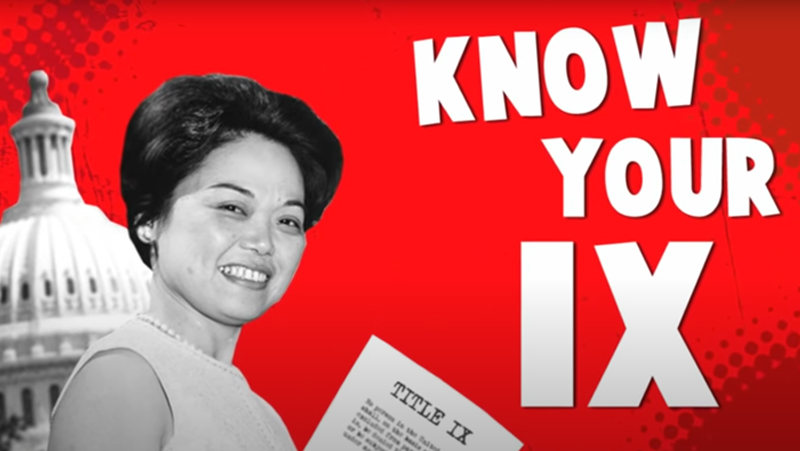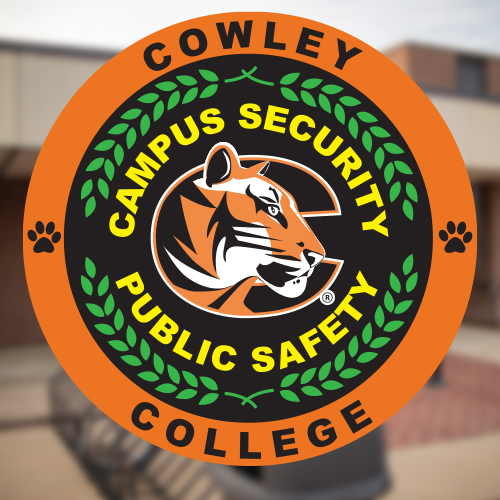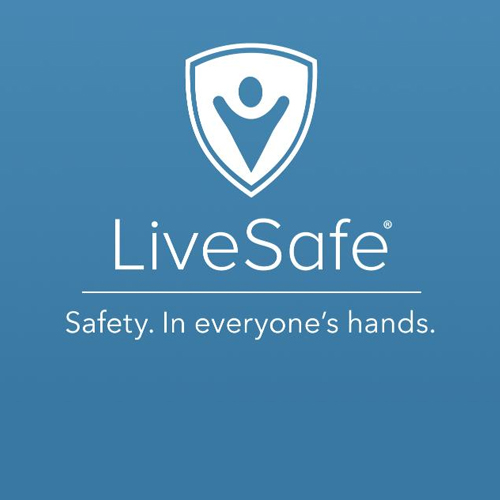Title IX
Knowing Your IX is a resource to all students, faculty and staff to help you understand your rights under Title IX.
Title IX is a comprehensive federal law that prohibits discrimination on the basis of sex in any federally funded education program or activity.
 Play Video
Play Video
Know Your IX
Important Questions
- Get to a place where you feel safe
- Seek a friend you can trust
- Don't shower or bathe any part of your body, douche, urinate, defecate, use medications or brush your teeth, if possible
- Stay in the clothes you are wearing or, if you've already changed, bring clothes, sheets and anything that was in contact with you during the assault in a paper bag (not plastic!) or wrapped in a clean sheet - don't clean or straighten the area
- Don't touch anything the accused may have touched or left behind - this physical evidence can help if a criminal charge is pursued
- Get medical help to check for internal injuries you might not be aware of, treat external injuries, be treated for certain STDs, and get information about HIV/AIDS and pregnancy prevention
- Consider having a rape kit done at the hospital - even if you don't think you want to press charges, having a rape kit allows you to have evidence collected should you change your mind later
- Seek counseling support
- Consider your legal options and ask questions for clarification
When it comes to confidentiality, we'll be up front with you.
- We'll take all reasonable steps to investigate and respond in a manner consistent with a student's confidentiality request and we'll let you know if we can't ensure confidentiality.
- If a student requests confidentiality and decides not to press charges in a sexual violence case, an anonymous report of the incident must still be made in order to comply with the Clery Act (campus crime reporting)
- On-campus counselors and advocates - like those working or volunteering in sexual assault centers, victim advocacy offices, women's health centers, as well as licensed and pastoral counselors - can talk with a survivor in confidence
- If the safety of others in the community could be at risk, the good of the whole may need to outweigh one student's confidentiality request.
Source: "Not Alone" Report of the White House Task Force to Protect Students from Sexual Assault, 4/20/14
When you file your initial report, you may not have named an assailant. As the investigation continues, you will be asked whether or not you knew your assailant. If you do not wish to name the assailant, it will increase the difficulty in investigating the incident, but the College will use all of the resources necessary to appropriately address any concerns that are raised.
Title IX protects all college students from retaliation if they report sexual harassment or violence. If the alleged perpetrator or his/her friends taunt you, call you names or harass you in any way, report this immediately!
Our Title IX Coordinator and others are here as resources to take strong, responsive action if any retaliation or new incidents of harassment occur. For example, our Department of Campus Security & Public Safety has officers on campus 24/7. You may call the Department of Public Safety any time at 620-442-0430.
Yes, if your assailant lives on campus or attends the same classes as you, the administration will begin work immediately to change your class schedule and your housing arrangement to minimize the opportunity that you will encounter your assailant on campus.
The administration will also place a no contact order on the assailant so that they understand they are not to have any contact with you whatsoever. If your assailant makes an attempt to contact you in person, by phone, or through friends, you should report this activity immediately.
No one expects you to be a trained rape counselor, but there are things you can do to help your friend to cope and to find help. Whether the assault occurred recently or a long time ago, it is helpful if you can:
- Believe them
- Maintain a calm manner
- Listen without interrupting
- Allow for tears and expression of feelings
- Convey genuine concern
- Provide accurate information
- Allow them to make his/her own choices
- Set judgments aside
- Maintain confidentiality
- Let them know that it's not their fault (You cannot say this enough!)
- Let them know that there are people who can help and that they don't have to go through this alone
- Refer your friend to help and encourage them to go. They trust you, which is why they are talking to you. You can use that influence to help them reach out for help
No, not unless you tell them. Whether you are the reporting party or the responding party, the College’s primary relationship is with the student and not with the parent. However, in the event of a major medical, disciplinary, or academic jeopardy, students are strongly encouraged to inform their parents.
If you experience sexual harassment, gender discrimination or sexual violence, we encourage you to reach out right away - we are here to help.
Contact:
Campus Security: Ark City: 620-442-0430
Local Police: 911
Residence Life: 620-441-5289
Counseling: 620-4415228
Health Services: 620-441-5236
Disability Services: 620-441-5557
Wichita Area Sexual Assault Center: 316.263.0185
Title IX Coordinator: 620-441-5557
Helpful Videos
 Play Video
Play Video
Tea Consent
 Play Video
Play Video
It's On Us - Hatch
Team Members
Team Training Materials
In response to 34 CFR Part 106.4(b)(10) of the 2020 Title IX Regulations that mandates the public sharing of materials used to train college Title IX team members, this page contains links to material used to train Cowley’s team members. This page will be updated periodically with additional material used to train throughout the year.
- 2021 Title IX Sexual Harassment Response Training
- 2021 Title IX Coordinator/Administrator Level One: Foundations
- 2021 Civil Rights Investigator Level One: Foundations
- 2021 Civil Rights Investigator Level Four
- 2020 Possible Policy & Legal Changes for Higher Education Under the Biden Administration
Pregnancy and Related Conditions
Questions & Answers
Title IX protects students and employees from discrimination based on pregnancy, childbirth, false pregnancy, termination of pregnancy, or recovery therefrom. Click the link below to read some frequently asked questions from students in postsecondary schools regarding their Title IX rights.






